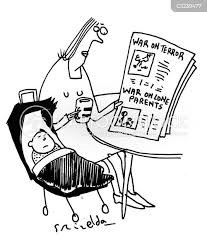Parenting as/in Crisis: Transcultural constructions of parenting and parenthood
Abstract
 This half-day workshop seeks to explore parenting and parenthood under the conditions of crisis/hardship. We want to bring into focus a variety of cases, contributing with a fresh view on parenting and parenthood that can help us to understand pathologies of parenthood resulting from warfare, migration, pandemic, colonialism/intergenerational trauma, and/or mass violence.
This half-day workshop seeks to explore parenting and parenthood under the conditions of crisis/hardship. We want to bring into focus a variety of cases, contributing with a fresh view on parenting and parenthood that can help us to understand pathologies of parenthood resulting from warfare, migration, pandemic, colonialism/intergenerational trauma, and/or mass violence.
While parenting is often assumed to be something we all know how to value – and even to do – and universal parenting programs that aim to prepare and support families in their transition and distress are being rolled out across the Globe (e.g., MANU in Greenland), parenting is in fact subject to extreme cultural and historical variation. As a pressure point for policy makers, service providers, and individuals, parenting raises questions of social and cultural belonging, equality, and futurity. When parenting takes place under the inauspicious conditions of war, cultural displacement, poverty, or illness these questions are amplified further by the suspension or relativization of normality. In this workshop we want to explore culturally specific manifestations of parenthood. We invite researchers using historical, sociological, anthropological, clinical, and literary approaches to this topic to share and compare perspectives through informal 15-minute presentations on their current work. Our hope is that the transcultural and transhistorical nature of parenting will become clear as we bring our different projects into conversation. The workshop will allow time to discuss future collaborations, events, and publication possibilities.
Registration
Please, not that this is a closed workshop, and registration is required. If you want to attend, please, contact Daria Schwalbe at daria@hum.ku.dk
- Family and wellbeing
- Bad parenting/the pathology of parenting
- Transcultural constructions of parenthood and psychological trauma
- Ideas of motherhood & fatherhood
- Parenting and psychiatry
- Parenting and language nexus: the language(s) of parenting, bilingual parenting, etc.
- Parenting and migration
- The morality of parenting / parenting and moral emotions
- Textual and visual representations of parenting / narratives about parenting in literature, film, television
- Parenting beyond, outside, and in the margins of the nation
- Parenting and war (trauma)
- Parenting and (mass) violence / abuse
- Perinatal mental health, postpartum psychiatric disorders
- Social and political dimensions of parenting and parenthood / Policies of parenthood
- Programs and interventions supporting parent-child relationships and development
- Raising bilingual children (migration, shame, guilt, child interpreting, etc.)
| 12.00 – 12.30 | Lunch and Informal Introductions |
| 12.30 – 13.30 |
The Case of Denmark Chair: Daria Helene Grøn and Anita, Parenting as a Foreigner in Denmark Jesper Vaczy Kragh, Danish child psychiatry in the clinic and beyond: histories of patients, families and practitioners Simon Ruben Husby, MindSpring: a psychosocial group intervention for refugees in Denmark Marta Kirilova, Language ideologies among parents of multilingual children |
| 13.30-13.50 | Break |
| 13.50 – 14.50 |
Transcultural Psychiatry Chair: Ana Antic Ana Cergol, Illegitimate Parenthood During World War II in Present-Day Slovenia Marie Meier, Parenting and Mental Maladies Ida Ghiai, Socialrådgiver, Kompetencecenter for Transkulturel Psykiatri. Maria Marti Castanek, Danish home visiting program for refugee families |
| 14.50-15.10 | Break |
| 15.10 –16.10 |
Cases from Elsewhere Chair: Tina Anna Toropova, Soviet Cinema, Children and Absent Parents Vera Skvirskaja, ‘Parenthood and Risks’. Cases from wartime in life and fiction. Cross-cultural perspectives Gabriel Abarca Brown, Becoming a (Neuro)Migrant: Attachment, Early Stimulation, and the Government of the Future of Chile Daria Schwalbe, The impact of crisis on family structure and domestic violence in Russia |
| 16.10-16.30 | Break |
| 16.30 – 17.30 |
Literary Examples Chair: Daria Martyn Bone, “This baby got plenty daddies”: coming-of-age and non-nuclear families in Jesmyn Ward’s writing Emily Hogg, Mothering and Paid Work Camilla Schwartz, Childfree Women and Queer Kinship |
| Summing up and Dinner | |
Map of South Campus
View directions.
View on map of the Faculty of Humanities - South Campus.
View map of South Campus (pdf).
